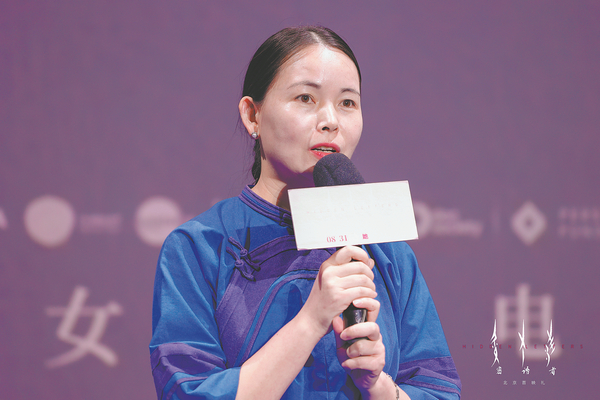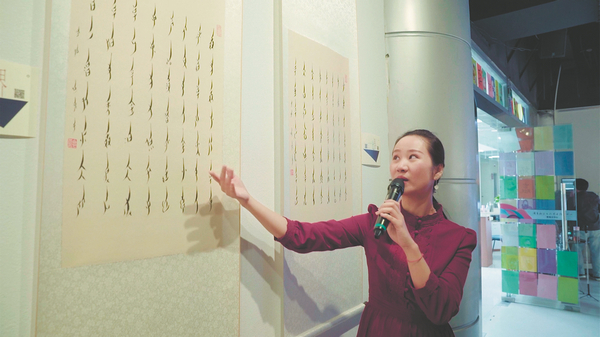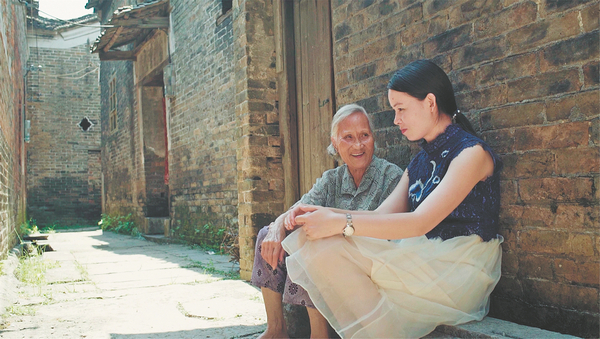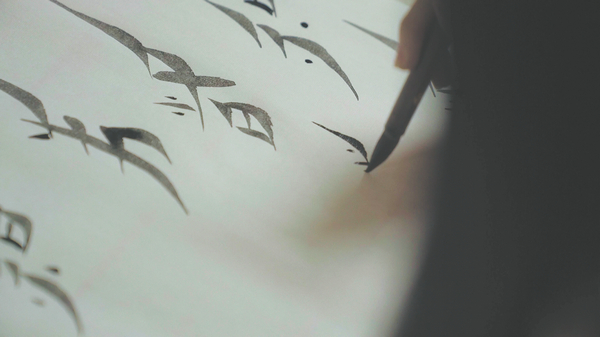
Hu creates her calligraphy works, including writing nyushu characters on folding fans. CHINA DAILYDocumentary, due to hit nationwide cinemas on Aug 31, weaves a contemporary story around an ancient, mysterious script called nyushu, Cheng Yuezhu reports.
With an origin and history shrouded in mystery, nyushu, a type of phonetic script, was passed down among the women of Jiangyong county, Yongzhou, Hunan province.
Its name gives away its distinct feature. Literally meaning"women's writing", the script was used exclusively by local women, who expressed or communicated with each other about their own experiences and sentiments.
While it is no longer in use in everyday life, Jiangyong Nyushu was listed in 2006 in the first batch of China's national-level intangible cultural heritage, with women working to pass down this tradition and carrying on the female power it represents.

Hu Xin, an inheritor of the nyushu script, speaks at the Beijing premiere of the documentary, Hidden Letters, on July 28. CHINA DAILYA recent documentary film, Hidden Letters, due to hit nationwide cinemas on Aug 31, zooms in on two of these women—Hu Xin, a young inheritor of the writing form, and Wu Simu, an artist aiming to promote its culture.
Instead of approaching the tradition from the aspects of history and inheritance, the documentary adopts a different perspective, by telling their respective life stories.
As a representative inheritor of the script, Hu often travels and attends events to promote the cultural heritage via calligraphy and singsong performances. But growing up and living in Jiangyong, she says she experienced gender discrimination, for example, her own divorce partly because her husband wanted a son.
Wu grew up in an open-minded family to become a musician and artist. She chooses to promote nyushu through her art works. Yet, she enters a relationship that required her to adhere to the social norms attached to being a wife, leaving her depressed and hopeless about the future.
The film hosted its Beijing premiere on July 28, featuring a post-screening Q&A session joined by director Feng Du, co-executive producer Qin Xiaoyu, and the two protagonists—Hu and Wu.
Feng first learned about nyushu in 2005 from the novel, Snow Flower and the Secret Fan, by American writer Lisa See, in which two women in the late Qing Dynasty(1644-1911)form a deep relationship and communicate with each other using the script.
"The novel gave me goose bumps. I asked myself, how, as a Chinese woman, I had been unaware of this part of history. The wisdom of the women depicted in the novel was beyond my imagination, so I read a lot of books to research about the texts, "Feng says.
"I was deeply struck not only by the creation of a script under such dire circumstances, but also by the sophisticated cultural structure established around the language. At the time, women formed sisterhoods and offered each other assurance and support throughout their lives, so that they could survive, thrive and empower each other. "
Prior to this film, Feng had been dedicated to documentary filmmaking, but primarily behind the scenes as a producer. She was able to collaborate with many young female Chinese filmmakers, and was moved by their unique perspectives arising out of observing society and the world.
Nyushu is a traditional script used exclusively by women, mainly in Jiangyong county, Yongzhou, Hunan province. CHINA DAILY
In 2017, after the birth of her daughter, she found herself struggling to juggle her many roles as a woman. Feeling overwhelmed, she thought of nyushu and the women behind it.
"Women in the past faced conditions far more difficult than ours, yet they chose a path of wisdom, by creating their own medium to empower themselves, which I think is extraordinary, "Feng says.
"So I thought of combining nyushu with contemporary women's stories. Rather than presenting it as an intangible cultural heritage, I want it to stay alive in the present and being integrated into modern narratives. Through the stories of contemporary women, I'd like to explore answers to our universal problems. "
While the documentary presents both women's struggles, they are also shown to find empowerment in the script.
Hu forms a close bond with 84-year-old He Yanxin, an inheritor who learned nyushu from her grandmother at the age of 10, and is now known as one of the last users and witnesses of it as a natural language.
"I think true strength is to be able to face everything with a composed and calm demeanor. As an inheritor, my efforts have allowed more people to understand and appreciate nyushu. With the growing attention and recognition received by the script, its strength reflects back on me, empowering me in turn, "Hu says.

Artist Wu Simu's representative calligraphy works include"letters in time capsule", comprising a rendition of a historical poem and her own verses in response. CHINA DAILYWu continues to create calligraphy works and host exhibitions, after ending the unpleasant relationship. Her works include what she calls"letters in time capsule", comprising a calligraphic rendition of a historical poem and her own verses as a response. The original poem was:I have no right to be in politics. No girl is allowed in school. Living with bound feet, my husband is arranged by my parents. Only nyushu brings me comfort.
And as a reply, Wu writes:I can feel you from your nyushu. As women our hearts connect. You went through so much pain. Now women have a new voice. We're our own king for marriage. My self-reliance and independence gave me freedom.
She says that this poem was written for those women who practiced nyushu in the past, informing them about the changes in women's life and status in the contemporary era, and also meant for herself, reminding herself to remain spiritually independent and never lose herself.
"Nyushu is a mark of women's history, a constant reminder of a time when women endured such dark times. To me, it serves as a beacon, constantly urging me to move forward, "Wu says.

Hu forms a close bond with 84-year-old nyushu inheritor, He Yanxin. CHINA DAILYFilm distribution platform Elemeet organized themed prerelease screenings to target specific audiences, including women-only screenings and screenings with intangible cultural heritage experiences.
At the Beijing premiere, audience members could choose a sticker with nyushu characters, each of them conveying a positive message, such as freedom, independence, contentment and well-being.
The film had been showcased at various international film festivals, and received or been shortlisted for multiple awards, including being shortlisted for best documentary feature at the 95th Academy Awards in 2023.
"What is interesting is that when we screen the film in different countries, female viewers often approach me afterward and ask, 'Do you think our situation here is different?'The truth is, the struggles and questions are quite similar everywhere, "Feng says.
"This is why I feel nyushu is still significant in the modern era. Just like what Simu said, it's like a beacon that illuminates us, not just in China but all around the world. "




